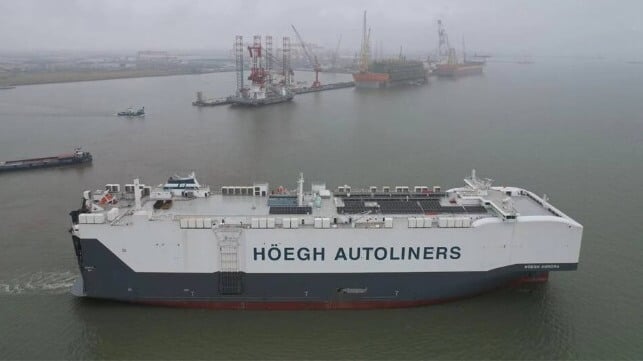Largest Car Carrier on Trials as Hoegh Gets Grant for Ammonia Propulsion

The first of the Aurora class of car carriers being built in China for Hoegh Autoliners has begun sea trials ahead of delivery and entry into service in August. With a capacity of 9,100 CEU, the vessel will be the largest yet built and will also be powered by a multi-fuel engine using LNG and ready for methanol or ammonia.
The building project for the vessels began in 2021 and was later extended from four to eight ships all to be built by China Merchants Heavy Industry (Jiangsu) Co. (CMHI). The company exercised additional options for four more vessels bringing the order currently to 12 ships with an option for yet four more. The first 12 will be delivered by 2027.
The first ship, Hoegh Aurora (16,250 dwt) began sea trials at the end of last week. She is scheduled to spend 10 days in the ocean east of Shanghai for testing and to ensure all her equipment is ready.
Beyond the size of the vessel, the design incorporates features to improve operations and efficiency. Hoegh reports that the decks have been strengthened and an improved internal ramp system will make it possible to carry electric vehicles on all 14 decks as well as provide flexibility for heavier project cargo. The ships are designed for cars as well as agricultural machinery and mining equipment.
Hoegh reports working with leading suppliers it was preparing for ammonia and low carbon fuels but it has also secured access to MAN’s groundbreaking 2-stroke ammonia engines which are expected to be commercially available in 20206. The last four vessels of the Aurora class will be fitted with the new engine and able to operate fueled by ammonia on delivery. All the vessels will also have 1,500 square meters (more than 16,000 square feet) of solar panels on the top deck and they will be equipped to use shore power in port.

that matters most
Get the latest maritime news delivered to your inbox daily.
To help offset the cost of building the vessels with ammonia engines as compared to being delivered ammonia-ready, the company reports it was just awarded the second tranche of funding from Norway’s Enova fund. It will be used to offset the cost of the ammonia development and installation. The company initially received $13.8 million in March to ensure the first two vessels were built to operate on ammonia. Enova is nearly doubling the grant with an additional $10.4 million to ensure all four ships are delivered to operate on ammonia.
The grant was part of the largest even series awarded by Enova, which was started by the Norwegian government to encourage and support the development of decarbonization technologies and to ensure Norway’s leadership in the emerging sector. A total of seven companies received grants to support both ammonia and hydrogen vessels.
